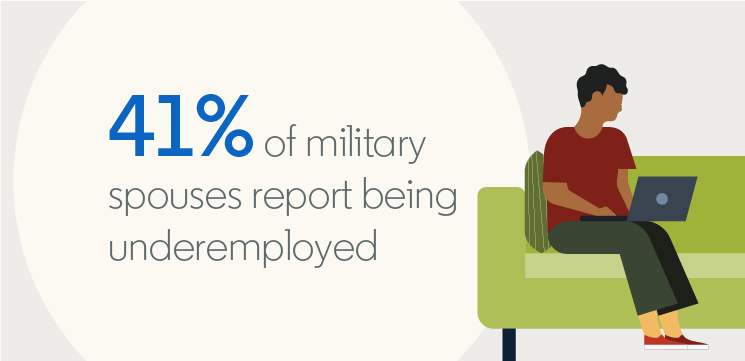
Why Military Spouses Make Great Nonprofit Employees — and Why You Should Hire Them
Military spouses face a common challenge — sustaining steady employment.
When I married my husband Adam, I married into military service. While none of us know exactly what we’re signing up for when we say yes to military life, I had a sneak peek. Growing up, I had a front-row seat to the best military spouse I know — my mom. Although she was employed, she did not have as many career opportunities as we do now. The tide is shifting for military spouses, but there’s still work to be done.
Over the past ten years, I’ve had to navigate relocations and career decisions myself. Fortunately, I found a military-friendly employer, the USO, that is already working with military spouses and transitioning service members who are actively seeking employment. Throughout our deployments to Afghanistan, Kuwait, the U.K., and now stateside in North Carolina, the USO has been one constant in our ever-changing lives.
Across our duty stations, I’ve noticed a common theme among military spouses, the backbone of our military. They are strong. They are resilient. They make great employees. And they deserve fulfilling careers.
Military spouses are more likely to be unemployed or underemployed
Military life fosters many qualities attractive to employers: discipline, teamwork, strong work ethic, loyalty, and adaptability. Too often, though, potential employers don’t draw the connection between practical military experience and civilian potential. This special military community faces unemployment rates that are four times the national average. Even those who are employed are still at a disadvantage, with 41% of military spouses identifying themselves as underemployed.

The top contributing factors to military spouse unemployment are continual relocation between duty stations and childcare considerations. However, with advances in technology and the increased capabilities to work remotely, this should not pose a major impact to employers.
Many highly qualified and experienced military spouses also struggle to market themselves effectively to employers. Hiring managers can have trouble understanding military lingo and navigating unfamiliar jobs and tasks to identify transferable skills.
However, military spouses have unique life experiences that can make them perfect for a service-minded career in the nonprofit sector. They are naturally part of serving a mission bigger than themselves.
Don’t let relocation concerns cost you great talent
Nonprofit hiring managers may be hesitant to consider a military spouse for a role because they might need to relocate for their partner. But hiring managers shouldn’t be.
First, not all military spouses will relocate. There are plenty of Reserve and National Guard spouses who are unlikely to relocate but are looking for employment. Additionally, many units like those in the Special Operations community do not require frequent relocation.
Second, COVID-19 has made many opportunities remote. Organizations that have the flexibility for a position to move to remote work when a spouse has to relocate will earn themselves an incredibly loyal employee.
Don’t ask, “When is your next move?” Look at candidates for who they are. In reality, you can’t guarantee that any employee won’t relocate so that should not be an assumed obstacle to hiring a military spouse.
Take thoughtful steps to welcome military spouses — and reap the benefits
To welcome more military spouse candidates, nonprofits can train their hiring managers and recruiters to identify skill sets from military experience. Hiring managers can further support military spouse candidates by:
Being flexible with working arrangements
Partnering with organizations like the USO that are already working with military spouses and transitioning service members actively seeking employment
Aligning your organizational brand with military-friendly organizations
After hiring a military spouse, if possible, connect them with veteran and military spouse mentors within your nonprofit to help with the transition. By continuing to break down barriers, nonprofit employers can help ensure the success of military spouses, while delivering untapped talent to the civilian workforce.
In short, hire a military spouse. You’ll be hitting the jackpot — just like I did when I married my soldier.
Randy Baker is Director of Corporate Alliances at the USO, a nonprofit organization that strengthens America’s military service members by keeping them connected to family, home, and country, throughout their service to the nation. Randy comes from a background in program management, corporate development, and volunteer management and is dedicated to supporting the nation’s service members and their families. She has served the USO in Kuwait, Afghanistan, and the United States.
Randy and her husband live in North Carolina where her husband serves with 3SFG at Fort Bragg. They have two young resilient daughters and three beagles that keep them on their toes in between military trainings and deployments.

